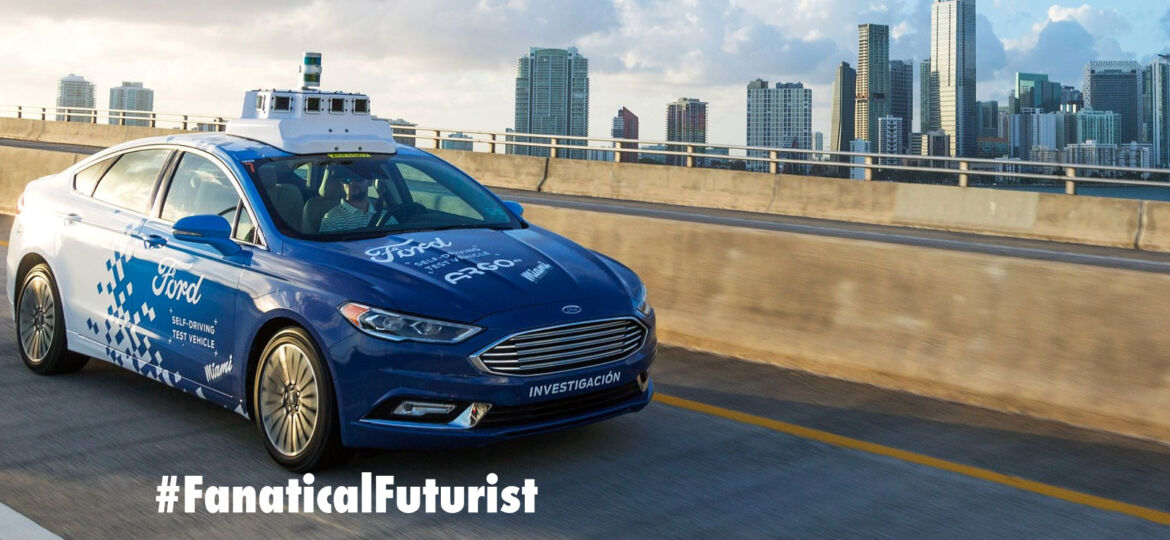
WHY THIS MATTERS IN BRIEF
The arrival of driverless vehicles on our streets won’t rely on consumers buying them, they’ll be provided as a service by companies, as such you can expect their appearance on streets near you to come sooner rather than later.
In the race to deploy driverless vehicles, Ford is pledging to have their own fleet navigating American streets by 2021. The motor company recently reiterated the commitment they originally made last year to releasing a self-driving taxi service “at scale” by their decided deadline, as the president of global markets, Jim Farley, told the Financial Times. And it comes right on the heels of Waymo’s roll out of their own driverless taxi service in Texas earlier this year.
“No driver required. Thanks to Ford, that statement will be possible in 2021, the year that we will have a fully autonomous vehicle in commercial operation,” reads a page on the company’s website.
Farley told the Financial Times that, in partnership with Domino’s Pizza, who’ve also been testing their own robo-delivery service on the streets of Germany, Ford has already begun localized testing in Miami with their prototype vehicles. As you may have guessed, these tests involve delivering hot n’ ready pizzas to customers who are offered a discount for walking to the end of the driveway to receive their ordered meal.
While tests, so far, have only been conducted with cargo, Ford plans to meet their 2021 deadline with a fleet that will carry both goods and people. Many motor giants, such as Volvo and Jaguar Land Rover, are partnering with ridesharing platforms like Uber and Waymo to achieve the same end goal. Ford, on the other hand, plans to develop and operate an independent fleet. Last year, they entered a joint partnership with the ridesharing company, Lyft, but, while the partnership still stands, Ford plans to exclusively manage this fleet for their own services.
The vehicles themselves will be custom built hybrids, like this one, with self-driving sensor systems directly incorporated into the initial design, and will use AI technology created by Argo. To date, Ford has invested over $1 billion in this Pittsburgh based startup, hoping their technology, once implemented, will have the power to beat out major competitors like General Motors, a company that also plans to deploy their own autonomous ride-hailing service in the coming years, and who also recently announced they’re ready to mass produce them.
If successful, a fleet of Ford robo-taxis could one day replace vehicles used for public transport or car pooling in heavily congested cities, where transportation costs are steep. However, if this is ever to become a reality, Ford’s self-driving network will need to pass rigorous safety testing to win over public trust, especially in the wake of a fatal accident earlier this year involving one of Uber’s semi-autonomous cars.
“Before thousands of self-driving vehicles can hit the streets, we have to be prepared to manage large, high-tech fleets efficiently, and the steps we’re taking in Miami represent a significant stride in that process,” wrote Sherif Marakby, the vice president of autonomous vehicles and electrification, in a blog post on Medium.
As well as carrying out their first tests, Ford is also developing an autonomous vehicle operations terminal in Miami to maintain their eventual fleet. It will include the facilities necessary to perform regular maintenance, washing and check-ups to ensure all vehicles are running smoothly.
Their ambitions are high, but in an industry where deadlines are so often pushed back, will they achieve this lofty goal? Ford was the pioneer of mass produced cars in America, after all, so don’t be surprised if they elevate this legacy in the near future.
















